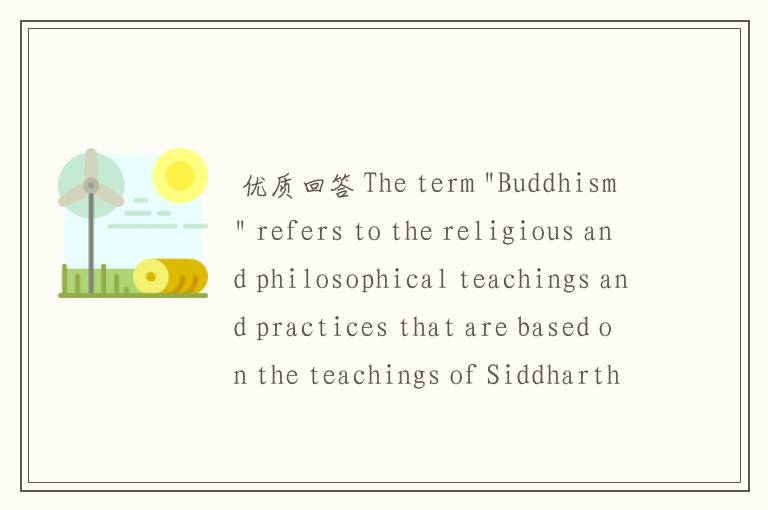- 1、
本文提供多篇内容参考,可直接点击跳转详细解答
(一)

优质回答The term "Buddhism" refers to the religious and philosophical teachings and practices that are based on the teachings of Siddhartha Gautama, also known as the Buddha. Buddhism originated in ancient India around the 5th century BCE and has since spread to various parts of the world.The core teachings of Buddhism revolve around the Four Noble Truths and the Eightfold Path. The Four Noble Truths are:1. Dukkha: The truth of suffering. Buddhism recognizes that suffering is an inherent part of life.2. Samudaya: The truth of the origin of suffering. Buddhism teaches that attachment and desire are the root causes of suffering.3. Nirodha: The truth of the cessation of suffering. Buddhism asserts that by eliminating attachment and desire, suffering can be overcome.4. Magga: The truth of the path to the cessation of suffering. Buddhism offers the Eightfold Path as a way to achieve liberation from suffering.The Eightfold Path consists of eight principles that guide individuals towards enlightenment and liberation from suffering. These principles are:1. Right View: Understanding the nature of reality and the Four Noble Truths.2. Right Intention: Cultivating wholesome intentions and motivations.3. Right Speech: Speaking truthfully, kindly, and compassionately.4. Right Action: Engaging in ethical behavior and refraining from harm.5. Right Livelihood: Choosing a livelihood that is ethical and does not cause harm.6. Right Effort: Making a consistent effort to cultivate positive qualities and eliminate negative ones.7. Right Mindfulness: Cultivating awareness and presence in the present moment.8. Right Concentration: Developing focused and concentrated mental states through meditation.In addition to these core teachings, Buddhism also encompasses various practices, rituals, and traditions that vary across different Buddhist traditions and cultures. These practices often include meditation, chanting, mindfulness, and ethical guidelines.Buddhism is a non-theistic religion, meaning it does not worship a creator deity. Instead, it focuses on the individual's pursuit of enlightenment and liberation through personal practice and self-transformation. Buddhists believe in the concept of karma, the law of cause and effect, and the cycle of birth, death, and rebirth (reincarnation).There are several major branches or schools of Buddhism, including Theravada, Mahayana, and Vajrayana. Each branch has its own unique teachings and practices, but they all share the fundamental goal of achieving liberation from suffering and attaining enlightenment.
阅读完本文《茶叶分类及基本功效:》,您是否对茶叶的分类及功效有了更深的认识呢?如果您还有想了解的内容,请关注www.entea.com.cn获取更多的帮助。
转载请注明来自,本文标题:茶叶分类及基本功效:
本文地址:https://www.entea.com.cn/cyjk/5054.html
